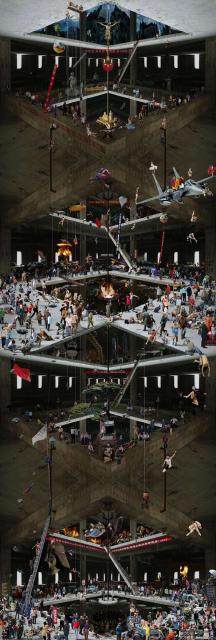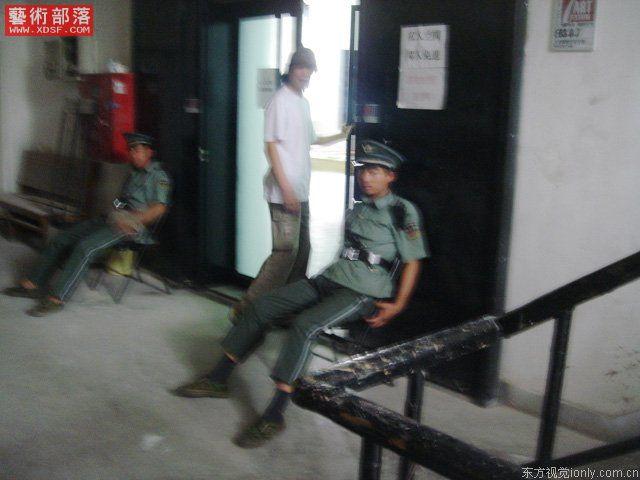The Gao Brothers (Gao Qiang, Born 1962 in Jinan, Shandong, China; Gao Zhen, Born 1956 in Jinan) are a pair of artist brothers based in Beijing, and authors of several published works, including “How Far Can You Walk in One Day in Beijing,” “The Current State Of Chinese Avant-Garde Art” and “The Report On the Art Environment,” who have been collaborating on installation, performance, and photography works and writing since the mid-1980s. Some of their works were published in “A History Of Modern Chinese Art,” “China Avant-garde Photography,” “The Best Photography Of China,” etc. and collected by Chinese and foreign people and museums.
The following work: “Never-Ending Construction of Building Number Four” was completed between 2000 and 2005. (Thanks to M.J. for the translation.)
From The Visual Journey Inside A Dilapidated Building – Gao brothers’ self-introduction:
A super giant dilapidated building rests empty for years. We don’t know when it was constructed, but we noticed its existence about five or six years ago. It is said that after completion, the building would have been the largest shopping and entertainment center in this city of Jinan, but we don’t know why it never got built. In these few years, this scrapped naked structure of more than 10,000 square meters intruded into our visual fields many times. The image of its majestic, ruined yet unusual form constantly stimulated our imagination.
An architectural piece, once standing, will grow powerful in its own language. Even a scrapped dilapidated building will silently narrate its own tale to itself. Dilapidated buildings have become unusual sights among the movement to tear down and rebuild in Chinese cities, and have become a kind of metaphor for the reality of today’s society. Facing a helpless and difficult reality, we often tend to self-exile or sleep, and yet, we cannot escape a gray-colored nightmare: our ephemeral lives will always be imprisoned inside a building of never-ending construction, with no past and no sight of the future.
We remember that the first time we entered the broken building on the bend of the Daming lake in Jinan was in 2000, when we started planning the public project “The Utopia of 20 Minutes Embrace.” It was near dusk that day, after we brought more than 150 “embracing” volunteers from the north of Jinan to the southern coast of the Yellow River, we rode to city center where the hushed building stood. We were to direct a mass embrace according to plan. In the shadowy remnants of light, everyone chose their embracing partner and in a sensibly disorganized fashion, held each other and stood, deep in a moment of warmth. After that, this “Building of Never-Ending Construction” became our dream venue. Every once in a little while, we would descend into its interior and capture an improvised performance through images, transforming our complex emotional reactions to life into a series of related and yet independent scenes in a visual collage: a young girl meets a lost migrant worker seeking temporary shelter. They face each other, gaze, and finally embrace; a group of young men and women do handstands hanging dangerously over the unprotected edge of the building; a few scenarios depicting usual day-to-day living are unusually gathered together…
In a complex, absurd, and yet unusual theatrical era, all the images depicting real life would lose significance and truth. Therefore, in some works, we have enlisted virtual resources to fabricate fiction. For we know that sometimes, fiction is closer to truth.
The following photos are local close-up shots of the “Never-Ending Construction of Building No. Four”
Some online comments about “Never-Ending Construction of Building No. Four”:
Netizen “Red Wall”:
The Gao brothers take advantage of time equals chaos to express the whole spectrum of society through its pores. Different times, different positions, different scenarios and different people magically appear in as if in a house of mirrors. In the optical illusion projects a majestic mirage of a building. A visual illusion then provokes the mind’s hallucination. Behind the remainders of the feast, is a distortion of distortions, darkness amidst darkness. For a society perforated with holes, where any movement is a cruel illusion, any bitterness is a vivid truth, this society hovers on the edge of collapse yet does not crumble, as anyone who views the picture understands – one just needs a stalk of straw. This is reality, reality with no disguise, Zhang Zerei could never have thought that 800 years later someone would be as realistic as he was.
Netizen “Cloud Roll”:
Zhang Zerei’s “Along the River During Qingming Festival” is displayed horizontally, exhibiting the inner and outer reaches of city lives of the people of Bianliang in Northern Song, a classic scroll that depicts the common people’s way of life in ancient China.
The building of never-ending construction by the Gao brothers is displayed vertically, connecting the sacred and the demonic, China suffering unprecedented change between heaven and hell. The two epochs reveal two scenes; one of Song dynasty and one of the modern era, one of Bianliang and one of China, one at peace and harmony, the other restless and unsettled, one on a grand scale but intricately detailed and uniquely refined; the other complicated, repetitive and fantastically disorienting. Its creation forms an enchanting artistic relationship with Zhang Zerei’s “Along the River During Qingming Festival,” an unparalleled masterpiece of allusion in Chinese art.
Here is also a blog post, written by their friend, artist Wu Wenjian:
Ha, I ran into them, this was taken by cell phone and it’s not the clearest. This was when the Gao brothers took me to the door, the moment they were saying goodbye.
The day before yesterday when I went to look for the Gao brothers, two security guards blocked me at the door. There were some notices pasted to the door of their studio, something about “Private Space, no tours,” and “Private space, please do not enter, call for appointment first”… only after I called the Gaos was I able to step inside. The Gao brothers say that even though their studio has not been open to the public for a long time, their family is still worried, and sent them two security guards…I thought to myself, when can I get this kind of treatment.
Why the Gao brothers are awesome
I had nothing to do this afternoon so I leisurely wandered to art district 798. After walking around for a bit, I went to the studio of the Gao brothers to get some water. As I approached the entrance of the studio, I noticed two chairs by the door, and had a strange feeling.
I went in and after some banter, Gao said: didn’t you see there were two security guards by the door? I said no, I only saw two chairs. Perhaps it was too hot and they went to get some air upstairs, Gao said. He said that because a relevant department saw that in their studio there were some art pieces that had some problems, they wanted to force them to remove the pieces. So the Gao brothers got into an argument with them, and that’s how the two security guards came about, for “protection.” They get here at eight in the morning and leave when the Gao brothers finish work, and they didn’t know how long this would last.
Hearing this I burst out laughing, you guys are so slick, blacker than the mine owners of Shanxi province! They have to spend their energy dealing with you, and you, without paying a penny, get two guards! The older Gao smiled with bitter helplessness: I feel bad for them, I gave them those two chairs you know. I see that it’s not easy for them, this hot weather, I even give them water everyday. Gao’s nephew came over to chat with me, he’s responsible for working at the front desk of the studio, so his work is similar in nature to that of a security guard. I tell him: so you’re free now, you don’t have to sit by the door, you should learn from those guards there, start work at eight. He says, I’m still dreaming at eight. The older Gao barked: stop acting like you’re some kind of prince.
From my memory, the Gao brothers never got mad, no matter the person or the situation. That the exhibits of the Gao brothers are banned is already a common expectation. A few days ago, the pieces they had sent to participate in an international exhibit were confiscated at customs. I have not yet heard that they argued with any relevant department. It seems like this time, they had been pushed too far. To provide two guards to protect artists, i don’t know what kind of status these artists have on a global level? How awesome they must be.
Seeing that they were in a bad mood, I didn’t feel like leeching a meal (every time I go I pretty much get a free meal). When I left, I saw the two guards, who were obviously peasants. Their eyes were filled with a dense obscurity; the look made my heart ill with pain.
This is my beloved country!
Here are some other works by the Gao brothers:









